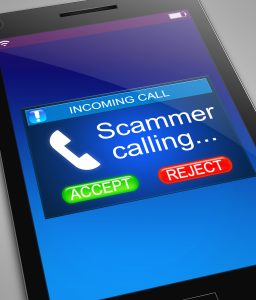You: Hello? 

Caller: Hello, this is (insert bogus name of scammer) from (bogus company or government agency). I am calling to verify your information for our records. Your address is (insert your address found on the Internet)?
You: Yes.
Caller: Thank you for confirming that information. Can you confirm your phone number?
You: Yes. My number is XXX-XXX-XXXX.
Caller: Great! Next, I need to confirm your date of birth and social security number.
If your “this is a scam” alarm is now activated, it should be. A call like the one above can be used to get you to willingly reveal information about your identity. In this scenario, the scammer is hoping you will be caught off guard and answer the questions or that you will be willing to “help”. Of course, either way, if you answer the questions you will be helping the scam artist on the other end of the line to your identity and its theft.
Today’s Tip is a reminder but also a permission slip of sorts. The reminder is that you should always be wary of anyone from any organization that calls you and requests personal information. Since you have not initiated the call, there’s no way for you to be absolutely positive the number on your caller ID is not spoofed or that you can or should trust the person who is calling you.
The permission slip of sorts is that you have the right to just say no and not reveal anything about yourself. In fact, you don’t even need to say “that is correct” if the caller supplies the information. There is absolutely nothing wrong with respectfully telling the caller, “I’m sorry. I don’t provide any personally identifiable information to anyone who calls me. If you would like to tell me why we need to talk, then I will – if I feel it’s necessary – call your organization.” Then, hang up and call the organization using the information you have on file or know to be correct.
I would be remiss if I didn’t include a disclaimer with today’s tip. The first time you do this, it will feel very uncomfortable because you aren’t used to saying “no”. You will find yourself wanting to know why the caller wants to talk to you and will be tempted to reveal the last four digits of your social to find out. You will also be surprised, should it happen, at how quickly the caller’s tone changes (and not in a good way). I’ve been there ever since I started refusing to provide my information to those who call me – many data breaches and swapped out debit cards ago. In my opinion, better safe than sorry. I only have one identity and if I don’t protect it, who will?
